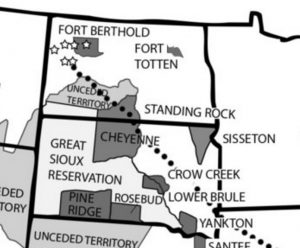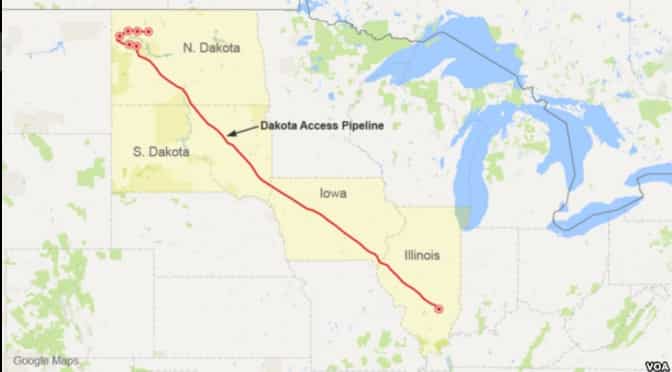
WASHINGTON DC | National Congress of American Indians (NCAI) President Brian Cladoosby and a delegation of Washington state tribal leaders visited the Standing Rock Indian Reservation on Tuesday, Aug. 30, in support of the tribe’s protest of the Dakota Access Pipeline.
The 1,168-mile pipeline will stretch from North Dakota to Illinois, crossing the Missouri River at Lake Oahe a half-mile from the Standing Rock Indian Reservation. The pipeline will transport over 570,000 gallons of crude oil per day, and has generated mass outcry due to the dangers the project poses to the Missouri River, and its proximity to tribal land and sacred sites located on those lands.
Several thousand protesters have convened at Sacred Stone Camp near Cannon Ball, N.D. in solidarity with the Standing Rock Sioux Tribe’s fight against the pipeline. Construction on the pipeline has been halted pending legal cases.
“As first stewards of this land, tribes fully understand that protecting our water and natural resources is paramount,” said NCAI President Cladoosby. “Any resource development must be done as tribes see fit, so these projects can coexist with our traditions and cultures to ensure that our resources are preserved for future generations.”
In defiance of federal statutes which require tribal consultation, the Standing Rock Sioux Tribe was excluded from the process until after surveys had already been conducted by Dakota Access. The State of North Dakota had been consulted and made aware of each step while the tribe was not.
The Standing Rock Sioux Tribe seeks to halt the Dakota Access Pipeline, and encourages supporters to voice their opposition to the U.S. Army Corps of Engineers, the White House, and U.S. Congress. While the Corps approved several sections of the pipeline without fully satisfying its trust responsibility to the Standing Rock Sioux Tribe, a written easement has yet to be granted to Dakota Access, LLC. The Tribe seeks to halt the pipeline until it can ensure the protection of its waters and sacred places.
In keeping with the trust relationship, NCAI supports the Standing Rock Sioux Tribe and all tribes to be fully included in the decision-making process when pipeline projects impact tribal governments, and their lands and resources.
The Dakota Access Pipeline is the latest chapter in long history of Indian Country having potentially hazardous pipeline routes and resources development through and near tribal lands without respecting tribal sovereignty.
Standing Rock Sioux Tribe sued the Army Corps of Engineers for failing to comply with National Environmental Policy Act (NEPA), National Historic Preservation Act (NHPA), the Clean Water Act (CWA), and the Rivers and Harbors Act, and asked for a preliminary injunction to stop construction immediately while the case goes forward. The case was heard on Wednesday, Aug. 24, by Judge James E. Boasberg in federal court. A decision will be issued no later than Sept. 9.
Please see NCAI’s action alert to see how you can support the Standing Rock Sioux Tribe, https://conta.cc/2c9sHsP.
At present, 184 tribal governments and organizations have also issued letters of support for the Standing Rock Sioux Tribe, with 75 resolutions passed.
NCAI is Standing with Standing Rock and all other tribes facing violations of tribal sovereignty across Indian Country.
The Washington delegation accompanying NCAI President Cladoosby included leaders from the Swinomish, Lummi, Puyallup, Nisqually, Squamish, Lower Elwha, Hoh, and Yakama tribes. A group from the Muckleshoot Tribe was also present at the camp.
The delegation’s 39-vehicle caravan included a totem pole carved by members of the Lummi Nation, which joined the delegation’s journey to Sacred Stone Camp.[xyz-ihs snippet=”Adsense-responsive”]







